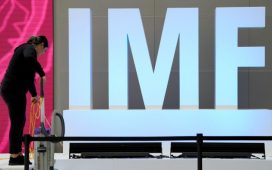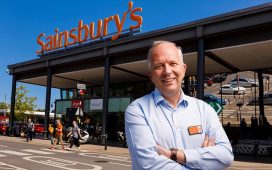
Calm in a crisis: Newton Investment Management boss Euan Munro
Making your first million is a memorable moment in anyone’s book. For fund manager Euan Munro, it was also a historic one for the country: Black Wednesday in 1992, when the UK crashed out of the European Exchange Rate Mechanism.
That episode, which almost broke the Bank of England, catapulted him from his upbringing in a mining village on to a career trajectory taking him to the pinnacle of the City.
As chief executive of Newton Investment Management, he is now one of the most powerful men in the Square Mile. He oversees an empire that includes offices in London, New York, Boston, San Francisco and Tokyo, managing about £87 billion of assets.
The firm is part of BNY Mellon Investment Management, one of the world’s largest, with £1.4 trillion of investors’ cash in its care.
Thirty years ago, Munro was a fledgling financier when the Bank desperately hiked interest rates in a doomed attempt to shore up sterling on Black Wednesday. Legendary tycoon George Soros made billions of pounds betting that the Old Lady would fail. On a somewhat lesser scale, Munro, then still in his early twenties, also made a fortune.
‘When Soros made his billions I made a million for the firm I was working at, Scottish Provident,’ says Munro. ‘It was the first million I made professionally. It was so exciting.
‘I have managed money through the dotcom boom and bust and the global financial crisis. I have always felt I have been most relevant to clients in times of turmoil.’
That may be reassuring to investors who have put their money with Newton, given the state of the world, its stock markets and the UK economy. ‘This is the kind of environment where I thrive,’ he says with relish.
As well as being a devotee of the doctrine that one ought never to allow a good crisis to go to waste, Munro is an advocate of what he calls thoughtful capitalism. It is, he says, about making considered choices about where to invest, including in the new, innovative and high-growth businesses the UK needs to prosper.
He contrasts this with so-called passive investment, where fund managers don’t try to pick the best performing assets, but simply track an index such as the FTSE 100.
Passive investment has become very popular, partly because the fees are lower. But Munro argues it also means that not as much thought goes into investment, less money is being put into exciting new projects, and investors are missing out on potentially high returns.
He argues that thoughtful capitalism is one way to address the challenge of providing decent pensions to an ageing population. It could help the Government achieve its aim for UK pension funds to invest more in British firms, not just plough savers’ cash into Government bonds and overseas shares.
‘The UK has an opportunity to be a leader in thoughtful capitalism and active management,’ he says. ‘A lot of money – a lot of people’s pensions – has flowed into passive funds. The result is nobody is thinking about whether the level of risk is right, or is producing the right level of income and growth.
‘If you want money to go to exciting new projects you need active management. The Government has little to lose in taking a position on thoughtful capital allocation.’
There has been lots of handwringing about the supposed decline of London as a financial centre and of the UK stock market, but Munro is an optimist. He says: ‘London has big advantages as a financial centre, including the time zone and an internationalist mindset.’
As for the UK stock market, he says companies whose shares are undervalued and have decent dividend yields look attractive in an environment where, in his view, inflation and interest rates are likely to remain higher for longer.
‘Globally, growth is quite hard to come by,’ he says. ‘There are some obvious reasons, including the fact governments are going to spend much more on servicing their debt. In 2021 the US government was spending 6 per cent of the tax take on servicing debt interest. That will be 16 to 18 per cent in 2025.
‘In the UK we will be comparable. If governments are spending money on servicing debt, it is less productive spending than just about anything else.’
In this scenario, he argues, solid UK brand name businesses should come into their own, adding: ‘The UK is a great dividend market. It might lack the explosive growth companies of some other markets, but it has the right characteristics for the future.’
Munro became head of Newton in 2021 after a stint at insurer Aviva. But he is probably best known for his time at Standard Life, where he was one of the architects of GARS – the Global Absolute Return Strategy fund, launched to small investors during the 2008 financial crisis. A blockbuster in its heyday, it fell to earth with a thump.

The fund – aimed at delivering returns despite market conditions – was recently described as ‘Holy Grail to Holy Fail’. After Munro left Standard Life in 2013, investors dwindled away and it no longer exists as an independent entity. Investors are still seeking returns less tied to the vagaries of stock markets. Newton is eyeing the multi-manager hedge fund sector.
Unusually in the world of fund management, which is dominated by upper crust types, Munro was brought up in a modest home in Scotland. His father was a teacher.
‘I was state educated, he says. ‘No one I knew talked about stock markets. It was a different world.’
His escape route was a physics degree at Edinburgh. He gravitated towards finance after realising scientists and engineers – however talented – didn’t become chief executives. He qualified as an actuary while at Scottish Provident. ‘I fell in love with markets when I realised the difference between saving and investing – putting your capital to productive use and making meaningful returns.’
Investing, he says, should be for everyone – important as people have to take more responsibility for funding their own retirement.
‘Unfortunately it is the preserve of the wealthy. If you don’t need instant access to savings you should look at stocks and shares,’ he says.
‘You can now get 5 per cent interest on cash, but inflation is 6.7 per cent so you are still going backwards. You can buy into an income fund which has the prospect of keeping pace with inflation.’
Munro and his colleagues try to identify fertile ground for investment – diabetes, obesity and ageing populations in the affluent West. He has a team of corporate sleuths, who look in depth into potential problems at companies where Newton is considering an investment.
He is, he says, wary of PR spin and doesn’t allow company managers to go through their slide deck when they pitch to him.
But he says the most dangerous investments are those linked to family and friends. ‘I have supported family members with business ventures that didn’t turn out very well,’ he says. ‘I would recommend that people don’t do it.’
Some links in this article may be affiliate links. If you click on them we may earn a small commission. That helps us fund This Is Money, and keep it free to use. We do not write articles to promote products. We do not allow any commercial relationship to affect our editorial independence.











